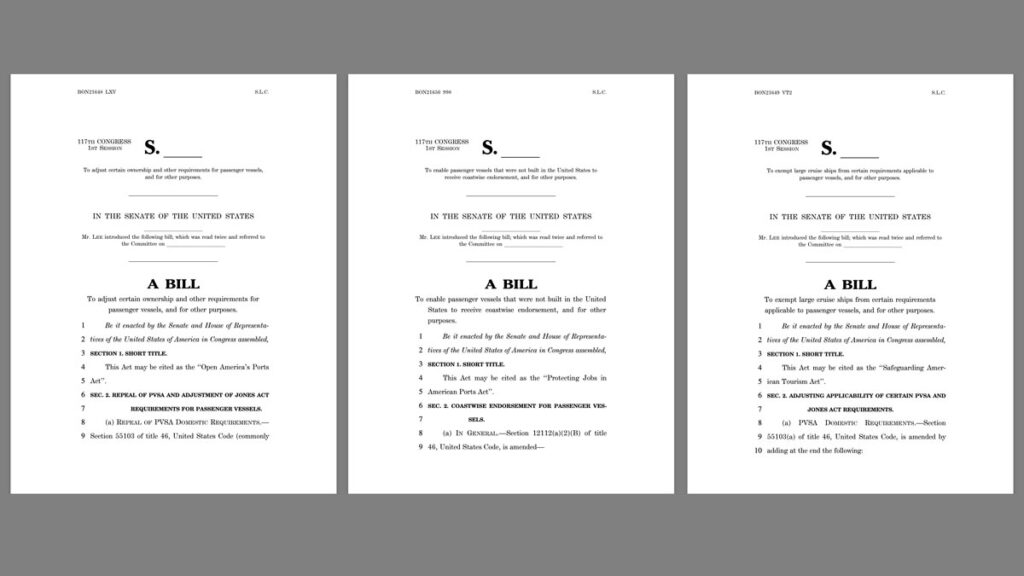Today, US Senator Mike Lee from Utah introduced three bills to repeal and reform the Passenger Vessel Services Act of 1886 (PVSA), an outdated, protectionist law that harms American jobs and American tourism.
“The PVSA is bad news,” said Sen. Lee. “This arcane law benefits Canada, Mexico, and other countries who receive increased maritime traffic, at the expense of American workers in our coastal cities, towns, and ports. Reducing demand for jobs and travel opportunities here in the U.S. is the opposite of ‘America First.’ And in the context of ocean liners, this ‘protectionist’ law is literally protecting no one, as there hasn’t been a cruise ship built domestically in over half a century. The PVSA is bad economics and bad law, and it’s far past time that Congress reconsider it.”
The PVSA requires that all ships transporting passengers between two or more U.S. ports (a “domestic voyage”) be American built, owned, flagged, and crewed. Due to these rigid and expensive requirements, many ship operators choose to domicile and conduct business elsewhere. As a result, these ships cannot operate continuously in the U.S., and must call at a foreign port in between stops at U.S. ports to remain in compliance with this 135-year-old law.
Senator Lee argues that by artificially restricting when vessels may call at United States ports and serve travelers, this arcane law diverts opportunities for economic activity in American coastal cities to other countries. For example, instead of spending more time in American ports and cities, cruises sailing from Washington to Alaska must make stops in Vancouver, Canada, while cruises from California to Hawaii must stop in Ensenada, Mexico. Even intra-island Hawaiian cruises are forbidden – cruises must travel 1,000 miles south to Fanning Island (Republic of Kiribati) to avoid running afoul of the PVSA. The PVSA reduces demand for American port workers in dockside maintenance and repair, and hurts job opportunities for those in the domestic travel and hospitality industries.
While Canada serves as a primary beneficiary of the law, which diverts commercial activity to its ports, the perverse incentives created by the PVSA also mean Canada controls northwestern American cruise seasons. During the pandemic, Canada has closed its ports to foreign ships. Cruises cannot sail without this required “foreign stop,” and this move could crush the Washington and Alaska tourism economy.
For details and text of the bills, see below:
Open America’s Ports Act
- Would repeal the PVSA and adjust cabotage requirements accordingly, allowing all ships that qualify under the laws of the United States to transport passengers from U.S. port to U.S. port.
Safeguarding American Tourism Act
- Would exempt large passenger vessels (“vessels with 800 or more passenger berths”) from PVSA requirements, and adjust cabotage requirements accordingly, allowing these ships to transport passengers from U.S. port to U.S. port.
- This targeted approach would not affect or harm any existing industry, as there hasn’t been a cruise ship built in the U.S. (and which would therefore meet the PVSA’s high bar) since 1958.
Protecting Jobs in American Ports Act
- Would repeal the “U.S.-built” requirement for passenger vessels operating between U.S. ports, thereby incentivizing American companies to develop voyages that increase traffic and economic activity – and opportunities for port workers – in American coastal cities and towns.
Last month, President Biden signed the Alaska Tourism Restoration Act into law opening the door to a 2021 Alaskan cruise season by temporary waiving the Passenger Vessel Services Act (PVSA) into early-2022.


It’s about time!
I’m all for it. I prefer leaving out of Seattle for Alaskan cruises. Also, this would allow more cruise ports in Alaska
This is the we want all the benefits of being an American company except having to obey American labor laws.
Vancouver and Victoria will be worried. They thought the Alaska waiver wouldn’t pass.
So if these laws are changed then they could offer cruises up/down the East Coast for example between cities like Boston, NY, Baltimore, Charleston, Savanah, Port Canaveral, Miami? That would be awesome!
That’s what I think, Michael. Wouldn’t that be great!
Long overdue!!!
This would only affect Victoria, not Vancouver. No WAY the port of Seattle can handle ALL Alaska cruise traffic. Vancouver is vital. Also, cruising out of Seattle is rough compared to Vancouver and missing the Inside Passage all the time? Nope. Vancouver is also way nicer and cleaner than Seattle.
Seattle and Vancouver are both connected by the same straight. As long as the ship is approved to sail thru CA waters, then the route can still be thru the inside passage.
SW flies non stop flights to Seattle, and then it’s a taxi ride to the terminals.
The Government of Canada can change the laws to make it favourable to them. Right now, during the cruise ship ban, the Canadian government considers Inside Passage as “internal waters” and not “territorial waters”, therefore the Innocent Passage rule would not apply.
I think the Jones Act is bad law – but say goodbye to what’s left of the American merchant marine if this actually passes.
Correction: Jones Act and Laws following a similar format
Doesn’t an international law have to be amended in international court?